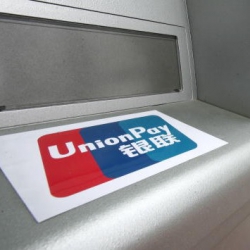The stocks of US casino companies which operate in Macau dropped today after the South China Morning Post reported that China’s government is imposing a 50% cut on ATM withdrawal limits in Macau.
The policy applies to only one bank’s ATM withdrawals in Macau, UnionPay, but that is the biggest payment service in China. Also, many are concerned the policy change is a sign of things to come. In either case, it is another bad sign that Macau’s land-based gambling economy — which has shown signs of recovery in recent months — might be facing new setbacks due to policies formulated in Beijing.
Cap on UnionPay Withdrawals
The UnionPay cap is set to $626 or 5,000 patacas, according to the Chinese news source. Bloomberg speculated that the new policy has to do with China’s tightening of capital controls, and little to do with casino regulation or gambling habits. Depreciation pressure is building on the yuan and Chinese officials, which caused the new ATM policy.
The three American companies affected by the news are Las Vegas Sands Corp., which dropped 13%; MGM Resorts, which dropped 4.3%; and Wynn Resorts, which fell 11%. The Chinese-Australian casino company, Melco Crown, also saw a decline of 14%.
Decline of Macau Casino Industry
That is one of the largest market declines for casino companies in recent memories. It comes after a tumultuous two-and-a-half year decline for Macau-based casino companies. The numbers in recent months had crept up as Las Vegas Sands and Wynn Resorts opened new Cotai Strip casinos, but those gains were wiped out in the selloff this week.
Xi Jinping’s Antipathy towards Gambling
It might not be axiomatic that President Xi Jinping dislikes casino gambling, but plenty of evidence suggests the current leader of China is antagonistic towards the gambling culture. In December 2014, President Xi visited Macau and told its officials to diversify their economy. In his mind, casino gambling had too much influence in Macau.
The result from local and national officials were a serious of policies that clamped down on the amount of VIP high roller gambling could happen in Macau. The credit card industry was investigated by Xi’s anti-corruption investigators. The number of trips and the amount of money which could be taken to Macau was limited. Locally, Macau officials set a 3% ceiling on casino revenue growth, while imposing table game limits and restrictive smoking policies.
How ATM Machine Limits Hurt Casinos
The 50% limitation on ATM machine transactions might be the starkest sign that the Beijing government is against casino gambling. Australian legislators set ATM limits when they wanted to restrict casino gambling, because players often replenish their bankroll with a trip to the ATM machine. In Australia’s case, the measure was designed to limit problem gambling. In China, the goal appears to be to further restrict Macau casinos’ gaming revenues.
If the Chinese government is taking a direct hand in limiting UnionPay withdrawals, then it is a major blow to the American casino companies operating in Macau. Often, policies are a little more complicated and wide-ranging than they appear 10,000 miles away. Analysts and investors need to look for other signs to confirm any suspicions they might have.
US-China Relations in the Trump Era
Further darkening the outlook for Macau casino companies is the current state of United States-China relations. Since President Nixon “opened” China in 1972, the United States and China have maintained relatively friendly relations. Trade ties have deepened, so that the world’s two largest economies developed a kind of symbiotic relationship. The bedrock of the relationship was the One-China Policy, America’s seeming acknowledgement that Taiwan is not an independent country, but a rogue province of mainland China. Even though the United States maintained close economic and military ties to Taiwan, the One-China Policy supported Chinese leaders’ propaganda back home.
President-Elect Donald Trump’s phone call with the Taiwanese president might have signaled new era in those relations. Donald Trump wants China to give the US a new trade deal and to use its influence in North Korea, and he is using Taiwan as opening move in his attempt to change America’s bargaining position. It is a bold and dangerous move, because it could signal the beginning of a trade war.
Diplomatic Revolution of 2016?
Nixon’s detente with China was leverage for dealing with the Soviet Union. Trump’s seems to be reversing course 44 years later. He seems to be moving closer to Russia in order to use it as leverage against China. If so, then a period of economic and political turmoil might happen between the United States and China.
While Trump’s move might create a new economic arrangement between the two countries — it would be a disaster for both to confront one another economically, much less militarily — any antagonism likely would affect company’s operating in China. With a Chinese president that seems hostile to the casino economy of Macau, the effect on Las Vegas Sands, MGM Resorts, and Wynn Resorts could be doubly bad.

